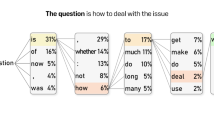Abstract
We analyze extensive games as interactive process models, using modallanguages plus matching notions of bisimulation as varieties of gameequivalences. Our technical results show how to fit existing modalnotions into this new setting.
Similar content being viewed by others
References
Aiello, M. and van Benthem, J., 2001, “Logical patterns in space,” in Logic, Language and Diagrams, P. Scotto di Luzio et al., eds., Stanford, CA: CSLI Publications.
Baltag, A., 2000, “Co-algebra and modal logic,” Manuscript, Amsterdam: CWI.
Barwise, J. and Moss, L., 1997, Vicious Circles, Stanford, CA: CSLI Publications.
Battigalli, P. and Bonanno, G., 1999, “Synchronic information, knowledge and common knowledge in extensive games,” Research in Economics 53, 77–99.
Blackburn, P., de Rijke, M., and Venema, Y., 2001, Modal Logic, Cambridge: Cambridge University Press.
Board, O., 2001, “Dynamic reasoning about knowledge and belief,” Paper presented at Italian Meeting on Game Theory and Its Applications, Ischia.
Bonanno, G., 1993, “The logical representation of extensive games,” International Journal of Game Theory 22, 153–169.
de Bruin, B., 2000, “Modeling knowledge in games. Topology and logic,” MA Thesis, Amsterdam: ILLC.
Goranko, V., 2001, “Coalition games and alternating temporal logics,” pp. 259–272 in Proceedings TARK Siena, J. van Benthem, ed.
Halpern, J., 2001, “A computer scientist looks at game theory,” Paper presented at Siena Summer School on Cognitive Processes and Rationality in Economics.
Harrenstein, P., 2000, “A modal interpretation of Nash equilibria and some related concepts,” in Proceedings LOFT-4, Torino, G. Bonanno, ed.
Kurtonina, N. and de Rijke, M., 1997, “Bisimulations for temporal logic,” Journal of Logic, Language and Information 6, 403–425.
Osborne, M. and Rubinstein, A., 1994, A Course in Game Theory, Cambridge, MA: MIT Press.
Parikh, R., 1985, “The logic of games and its applications,” Annals of Discrete Mathematics 24, 111–140. EXTENSIVE GAMES AS PROCESS MODELS 313
Pauly, M., 2001, “Logic for social software,” Ph.D. Thesis, Amsterdam: ILLC.
Rodenhäuser, B., 2001, “Updating epistemic uncertainty,” MA Thesis MoL-2001-07, Amsterdam: ILLC.
Stalnaker, R., 1999, “Extensive and strategic form: Games and models for games,” Research in Economics 53, 293–291.
Stirling, C., 1999, “Bisimulation, modal logic, and model checking games,” Logic Journal of the IGPL 7, 103–124.
van Benthem, J., 1996, Exploring Logical Dynamics, Stanford, CA: CSLI Publications.
van Benthem, J., 1997, “Dynamic bits and pieces,” Report LP-97-01, Amsterdam: ILLC.
van Benthem, J., 1999, “When are two games the same?,” Amsterdam: ILLC.
van Benthem, J., 2000, Logic in Games, Electronic Lecture Notes, Amsterdam: ILLC.
van Benthem, J., 2001a, “Games in dynamic-epistemic logic,” Bulletin of Economic Research 53, 219–248.
van Benthem, J., 2001b, “Games over time,” Amsterdam: ILLC.
van Benthem, J., 2001c, “Logic games are complete for game logics,” Studia Logica, to appear.
van Benthem, J., van Eijck, J., and Stebletsova, V., 1994, “Modal logic, transition systems and processes,” Journal of Logic and Computation 4, 811–855.
Wagner, K., 1970, Graphentheorie, Mannheim: Bibliographisches Institut.
Author information
Authors and Affiliations
Rights and permissions
About this article
Cite this article
van Benthem, J. Extensive Games as Process Models. Journal of Logic, Language and Information 11, 289–313 (2002). https://doi.org/10.1023/A:1015534111901
Issue Date:
DOI: https://doi.org/10.1023/A:1015534111901




